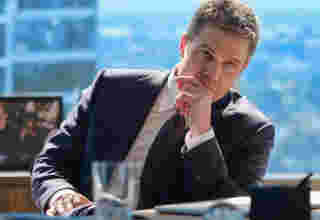
One of the most anticipated movies of the past year, director Greta Gerwig’s subversive comedy fantasy Barbie—starring Margot Robbie as the Mattel doll—is finally here, and it triggers a truly radical thought: Ken has stolen the film.
That may not have been what Gerwig, Mattel or Warner Bros. had in mind with this bright-pink extravaganza, but Ryan Gosling is flawlessly funny as the plastic male who exists only as a sort of chaste, chisel-chested consort to Barbie.
In Barbie’s heady but over-intellectualized script (by Gerwig and Noah Baumbach), Ken tags along when Barbie journeys to real-world Los Angeles. Dressed in a cowboy uniform that suggests either Toy Story’s Woody or Jon Voight in Midnight Cowboy, he learns that men still seem to hold most of the power, and returns to Barbie Land with visions of establishing a new patrimonial order.
Now favoring a faux fur coat that makes him look like a surfer pimp, he moves into Barbie’s Dreamhouse and reduces the whole Barbie line to subservient, man-obliging nitwits who don’t mind pretending to enjoy a mansplained screening of The Godfather.

Ken is a sexist, a fascist and still pretty dumb, but he’s also fully realized psychologically. He’s the closest a toy will ever come to Raging Bull. Gosling hits the precise middle note between flesh and plastic. But, of course, the movie is really about Ken’s other, better half, played by Robbie with a radiant sweetness that might have worked better with a bit more satiric bite (Amy Schumer was to have starred in a much earlier incarnation).
Barbie is a very clever attempt — perhaps an exceedingly clever attempt — to breathe new meaning and significance into the doll. But this isn’t often distinguishable from an attempt to subvert the conceptual and marketing genius that have made Barbie, with her melted-lozenge figure and fashion-accessorized careers and lifestyles, the most recognizable doll in civilization and a controversial feminine fantasy figure.
These contradictory impulses, to reinterpret Barbie with a degree of teasing reverence or simply to pull her apart, tussle throughout the movie from the first scene, a joke inspired by 2001: An enormous Barbie, as tall and vertical as that film’s black monolith, appears before a society of girls playing with baby dolls.
This Barbie (we’re told by Helen Mirren, who narrates from time to time) will lead girls to a new level of imaginative play — from now on they’ll engage with a doll who can represent the women they will grow up to be. And yet this Barbie, who looks as if she could have upheld the roof of the Parthenon, is somehow also monstrous and alien, a Mattel goddess banishing the competition. If Gerwig depends on pop-culture memory to connect Barbie and the 2001 monolith, it’s only fair to say that you might also be reminded of the killer doll in Squid Game. (And doesn’t 2001 end with the image of a glowing astral fetus — the ultimate baby doll? But never mind.) It’s complicated.

At any rate, the narrative now introduces us to Barbie Land, a sort of Swiftian utopia — reference point: Jonathan Swift, not Taylor — where cute Barbies of all types are in charge, while a corresponding league of Kens (including Simu Liu) play on the beach and hope that someday they’ll feel empowered and validated by being acknowledged by a Barbie of their own. (The film all but forces you to talk in this sort of jargon.)
Everything is well, until Robbie’s Barbie begins having fleeting intimations of mortality, little oatmilk clouds in her coffee. Soon after that her feet flatten out and she develops a small but alarming patch of cellulite. These irrepressible death thoughts (as the film describes them) don’t make too much sense — does Paddington Bear worry about nonexistence? But this is the narrative Barbie must follow — she’s Gerwig’s plaything — and it’s why she travels into the real world.
She has a quest: To discover the girl whose sense of sadness, disenchantment and frustration may have caused her to play with Barbie in a hostile or degrading manner. (A hand just shot up in the back. Yes, you have a question? “I do, but it’s really more of an observation: Why shouldn’t a girl be allowed to play with a Barbie in a hostile or degrading manner? If a kid wants to feed a toy to the dog, or throw it out the window and into the birdbath, is that really a problem? Is Mattel trying to rewire our brains with Barbie care instructions?”)
The mingling of fantasy and reality in Los Angeles has some of the fun of Woody Allen’s Purple Rose of Cairo: Mattel’s male-dominated executive board (headed by Will Ferrell) panics at the prospect of what a human-sized, free-will Barbie will do to the company’s bottom line. He and his staff of suits try to capture her, put her back in her packaging — an enormous cardboard box — and return her to Barbie Land. (For the rest of your life you may not be able to see a Barbie in a store aisle without imagining her trapped in a bright little casket, airless beneath a lid of cellophane.)
The L.A. expedition also provides the movie’s most touching and emotional moments, as Barbie encounters humanity and, unlike Ken, warms to a world that offers a richer, more ambiguous form of happiness.
When she tells an old woman at a bus stop, “You’re beautiful,” the woman looks startled, then answers: “I know I am.” Gerwig handles these exchanges gracefully and simply, as if she had gone back to Louisa May Alcott and come up with Little Plastic Women. If only there had been more scenes like that. Robbie smiling through tears is an extraordinary thing to experience.
Meanwhile, the movie gears up for a strange, elaborate finale that has something to do with Ken’s determination to suspend the Barbie Land Constitution. It’s House of Cards Barbie! She outfoxes him, as you’d expect. But no summer movie should ultimately hinge on its heroine grasping the idea of “cognitive dissonance.” Again, it’s complicated.
At times you may wish the script had been handed to Paul Rudnick, with his sharp, neat sense of camp, absurdity and hypocrisy. Just google Addams Family Values, which he wrote, and “Malibu Barbie.” You’ll find an insane little disquisition, performed by Joan Cusack, that’s possibly as telling as all of Barbie.
Barbie opens in theaters Friday.
[via]







